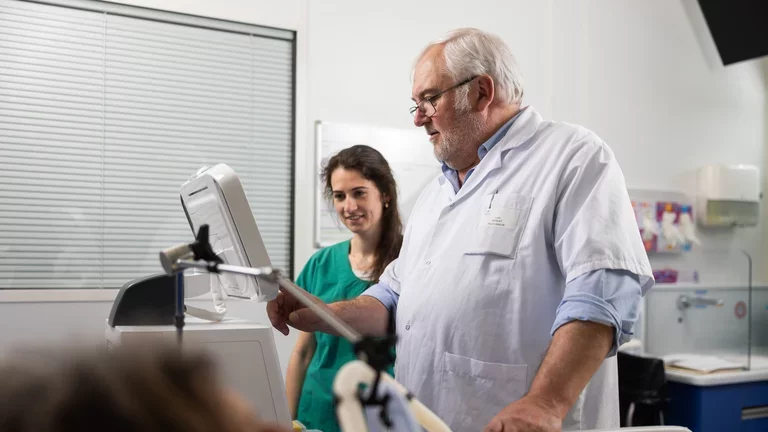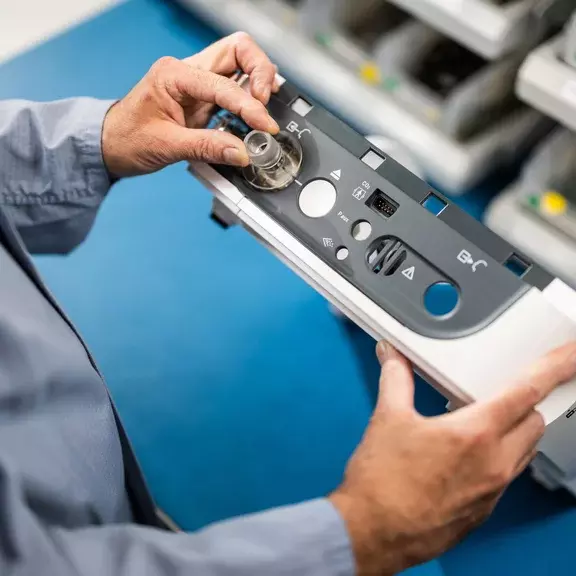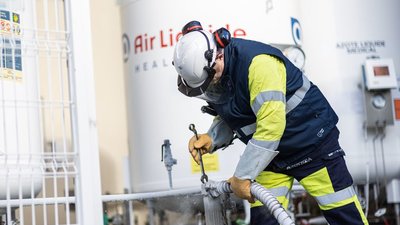‘Decide calmly, ventilate serenely’
This is the promise of our MedTech company, Air Liquide Medical Systems, to intensive care professionals
Published on June 06, 2024
4 minutes

Active in the ventilation market for 50 years, Air Liquide Medical Systems (ALMS) designs, produces and markets medical devices, in particular ventilators used in intensive care units (ICU) for patients suffering from respiratory distress. With the aim of facilitating the work of caregivers and improving patient care, ALMS has forged an exemplary partnership since 2019 with Angers University Hospital. Find out how the expertise of a MedTech company and of a university hospital come together to invent innovative ventilators.
Innovation under the banner of a public-private partnership
The cooperation between the two entities began 5 years ago, and over the years has built up a relationship of trust between the clinicians at Angers University Hospital and the engineers at ALMS. Jean-Christophe Richard, ALMS Medical Director explains: "The key to success is to listen to the intensive care doctors and caregivers, to understand their needs precisely and to seek to improve the interfaces and functionalities of the ventilators iteratively. We are working very closely with the Angers University Hospital (CHU), with the aim of providing intensive care physicians with diagnostic aids that will help them make decisions about the ventilation protocol to be implemented for patients in critical situations".
Professor Alain Mercat, head of the intensive care department at the University Hospital, adds: ‘Our role is to independently test the prototypes, to have elements clarified, to ask for corrections, and to test again and again, in order to share our feedbacks on the ventilators under development so that ALMS can improve and adjust their functionalities’. Jean-Christophe Richard concludes: ‘We are in an efficient partnership model to develop solutions based on the needs of the most critical patients and carers, while being extremely agile. Together, we are working to design ventilators that are easy to use and that make it easier to take the right decisions for each patient in acute respiratory distress.’
Innovation in medical devices in a few figures
- Approximately 5 years or 20,000 man-days of development to design a new ventilator medical device
- 70 engineers involved in the development
- Industrial and clinical expertises
- More than 20 scientific publications per medical device
- More than 10 patents filed
Vent'Lab, an academic research laboratory at the heart of the intensive care unit
Just a few steps away from patients requiring respiratory assistance, the Vent'Lab brings together intensive care doctors, emergency physicians from Angers University Hospital and engineers from ALMS. 'A shared passion for applied physiology and a common desire to contribute to advances in respiratory assistance care have led to research work in an agile way. This research regularly results in scientific publications. All our innovation work is guided by the need to better meet the needs of intensive care doctors and patients,’ says Jean-Christophe Richard. Professor Alain Mercat added: ‘I am delighted to have collaborated on a new ventilator that offers integrated diagnostic tools to easily adapt ventilation settings for patients with the most severe forms of acute respiratory failure. For us, having automatic functional explorations that give a precise assessment of the patient's respiratory physiology is a notable innovation.'
Towards a greater health sovereignty for Europe
At a time when resuscitation needs proved strategic during the latest Covid crisis, ALMS is the only ventilators manufacturer for hospitals in France, thereby contributing to Europe's health sovereignty. With only 10% of components sourced outside Europe, ALMS is also committed to selecting its suppliers according to geography. ALMS has an assembly line located in Antony in France, on which more than 180 components are assembled by trained and qualified operators. Four hours of assembly, comprising five stages, are required to manufacture the ventilators. The last phase is the final inspection, which guarantees compliance with the 4,000 standard requirements and their reliability through a battery of 80 test protocols.
A new ventilator is therefore the result of a process of innovation combining the expertises of a MedTech company and the experiences of clinicians to bring value to caregivers by making their work easier and to patients by improving their care.

